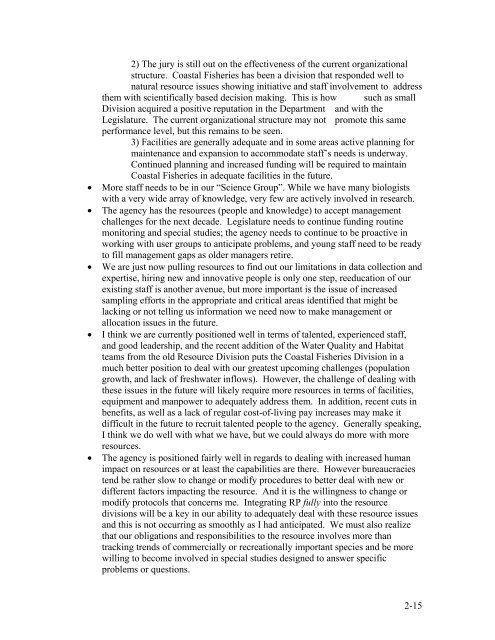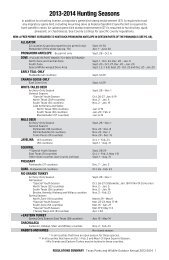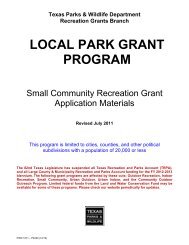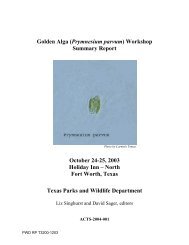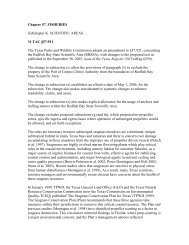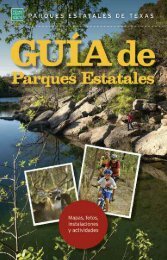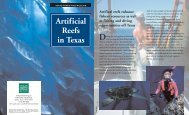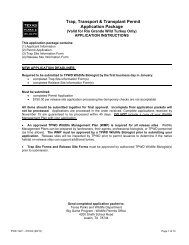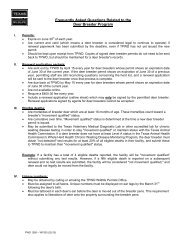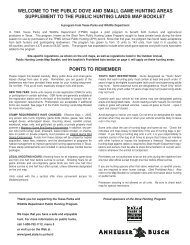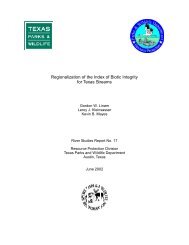1-1 Appendix 1 Responses to survey questions administered to ...
1-1 Appendix 1 Responses to survey questions administered to ...
1-1 Appendix 1 Responses to survey questions administered to ...
Create successful ePaper yourself
Turn your PDF publications into a flip-book with our unique Google optimized e-Paper software.
2) The jury is still out on the effectiveness of the current organizational<br />
structure. Coastal Fisheries has been a division that responded well <strong>to</strong><br />
natural resource issues showing initiative and staff involvement <strong>to</strong> address<br />
them with scientifically based decision making. This is how such as small<br />
Division acquired a positive reputation in the Department and with the<br />
Legislature. The current organizational structure may not promote this same<br />
performance level, but this remains <strong>to</strong> be seen.<br />
3) Facilities are generally adequate and in some areas active planning for<br />
maintenance and expansion <strong>to</strong> accommodate staff’s needs is underway.<br />
Continued planning and increased funding will be required <strong>to</strong> maintain<br />
Coastal Fisheries in adequate facilities in the future.<br />
• More staff needs <strong>to</strong> be in our “Science Group”. While we have many biologists<br />
with a very wide array of knowledge, very few are actively involved in research.<br />
• The agency has the resources (people and knowledge) <strong>to</strong> accept management<br />
challenges for the next decade. Legislature needs <strong>to</strong> continue funding routine<br />
moni<strong>to</strong>ring and special studies; the agency needs <strong>to</strong> continue <strong>to</strong> be proactive in<br />
working with user groups <strong>to</strong> anticipate problems, and young staff need <strong>to</strong> be ready<br />
<strong>to</strong> fill management gaps as older managers retire.<br />
• We are just now pulling resources <strong>to</strong> find out our limitations in data collection and<br />
expertise, hiring new and innovative people is only one step, reeducation of our<br />
existing staff is another avenue, but more important is the issue of increased<br />
sampling efforts in the appropriate and critical areas identified that might be<br />
lacking or not telling us information we need now <strong>to</strong> make management or<br />
allocation issues in the future.<br />
• I think we are currently positioned well in terms of talented, experienced staff,<br />
and good leadership, and the recent addition of the Water Quality and Habitat<br />
teams from the old Resource Division puts the Coastal Fisheries Division in a<br />
much better position <strong>to</strong> deal with our greatest upcoming challenges (population<br />
growth, and lack of freshwater inflows). However, the challenge of dealing with<br />
these issues in the future will likely require more resources in terms of facilities,<br />
equipment and manpower <strong>to</strong> adequately address them. In addition, recent cuts in<br />
benefits, as well as a lack of regular cost-of-living pay increases may make it<br />
difficult in the future <strong>to</strong> recruit talented people <strong>to</strong> the agency. Generally speaking,<br />
I think we do well with what we have, but we could always do more with more<br />
resources.<br />
• The agency is positioned fairly well in regards <strong>to</strong> dealing with increased human<br />
impact on resources or at least the capabilities are there. However bureaucracies<br />
tend be rather slow <strong>to</strong> change or modify procedures <strong>to</strong> better deal with new or<br />
different fac<strong>to</strong>rs impacting the resource. And it is the willingness <strong>to</strong> change or<br />
modify pro<strong>to</strong>cols that concerns me. Integrating RP fully in<strong>to</strong> the resource<br />
divisions will be a key in our ability <strong>to</strong> adequately deal with these resource issues<br />
and this is not occurring as smoothly as I had anticipated. We must also realize<br />
that our obligations and responsibilities <strong>to</strong> the resource involves more than<br />
tracking trends of commercially or recreationally important species and be more<br />
willing <strong>to</strong> become involved in special studies designed <strong>to</strong> answer specific<br />
problems or <strong>questions</strong>.<br />
2-15


